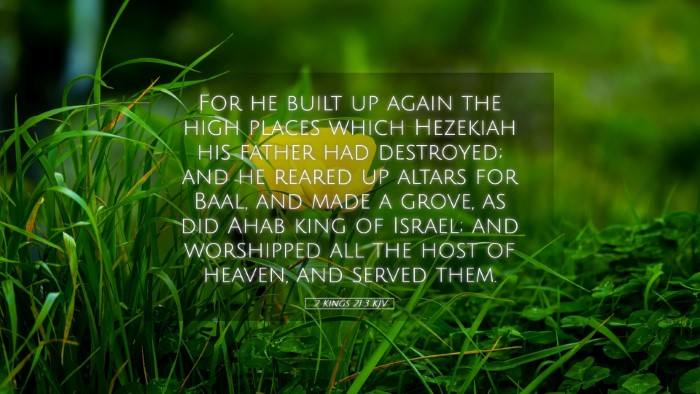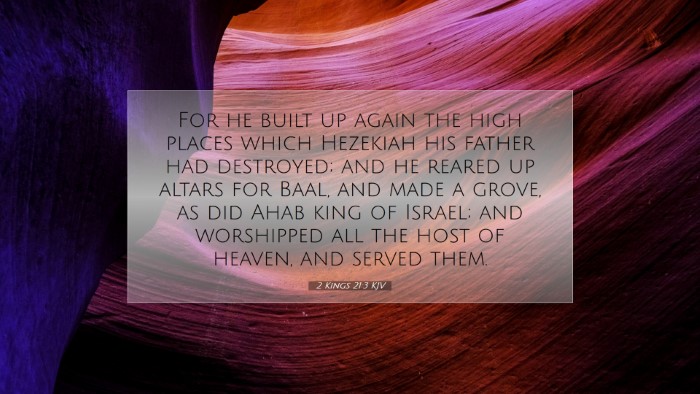Commentary on 2 Kings 21:3
Verse: "For he built up again the high places which Hezekiah his father had destroyed; and he reared up altars for Baal, and made a grove, as did Ahab king of Israel; and worshipped all the host of heaven, and served them."
Contextual Overview
2 Kings 21:3 describes the reign of Manasseh, one of Judah's most infamous kings. His actions marked a period of spiritual decline and disobedience, contrasting sharply with the reforms instituted by his father, Hezekiah. This commentary synthesizes insights from several public domain sources to provide a holistic understanding of this verse.
Historical and Theological Insights
- Manasseh's Reign: Manasseh became king at a young age and ruled for fifty-five years. His long reign had profound implications for the spiritual health of Judah. Matthew Henry notes that the extensive span of his rule allowed for significant influences of idolatry to permeate the kingdom.
- Rebuilding the High Places: The high places mentioned in this verse refer to worship sites that were often associated with pagan worship. Albert Barnes emphasizes that Hezekiah's destruction of these sites was a crucial move towards the worship of Yahweh. Manasseh's restoration of these high places symbolized a relenting of progress towards monotheism.
- Idolatry and Foreign Influences: The text mentions the worship of Baal and the making of groves akin to practices of Ahab, king of Israel. Adam Clarke points out that Manasseh not only reintroduced idolatrous worship but also borrowed practices from the northern kingdom, reflecting a syncretism that severely compromised Judah's religious integrity.
- Worship of the Host of Heaven: This phrase denotes the worship of celestial bodies and is reflective of a major deviation from the covenant faithfulness required of God's people. Matthew Henry warns that such practices often led to moral and ethical decline within the community, as seen in Manasseh's reign.
Theological Ramifications
- Rejection of Divine Authority: The actions of Manasseh illustrate a profound rejection of the divine guidelines established through the Law. It shows an overt act of rebellion against God, which is an ever-relevant theme within the biblical narrative, as highlighted by Albert Barnes.
- Implications of Leadership: The influence of a leader on the spiritual direction of a nation is starkly illustrated here. Clarke notes that the behavior of Manasseh led the people of Judah into deep moral crisis, emphasizing the responsibility of leaders to direct their followers towards righteousness.
- Judgment and Mercy: The eventual consequences of Manasseh’s reign are also tied to the themes of divine judgment and mercy. The prophet Jeremiah later highlights this period as one of significant infraction against God’s statutes, but there is also mention of Manasseh's later repentance (2 Chronicles 33:12-13), illustrating the potential for redemption in God's mercy.
Practical Applications
- Awareness of Spiritual Decline: Pastors and theologians should recognize the subtle ways in which societies can drift from theological grounding. This verse serves as a reminder of the ease with which idolatrous practices can seep into religious life.
- Impact of Worship Practices: The methodologies and forms of worship actively shape the spiritual climate of a community. There can be significant theological implications in adopting practices that may appear benign but ultimately lead away from authentic worship of God.
- Leadership Responsibility: Leaders in the church and community bear the weight of their influence. As seen in Manasseh’s example, the decline of a nation is often mirrored in the actions of its leaders. Therefore, there is a call for pastoral integrity and adherence to scripture.
- Tension of Idolatry: The historical context of this verse serves as a framework for understanding contemporary forms of idolatry, whether they are modern secularism, materialism, or other distractions that can lead believers astray.
Conclusion
2 Kings 21:3 offers a stark representation of the challenges faced by God’s people in maintaining faithfulness amidst influences that encourage deviation from divine truth. The synthesis of insights from Matthew Henry, Albert Barnes, and Adam Clarke sheds light on the profound theological and practical implications of Manasseh's actions.
This verse stands as a cautionary tale for contemporary pastors, students, and scholars, reminding them of the persistent danger of idolatry and the critical importance of uncompromising leadership grounded in the truth of Scripture.


